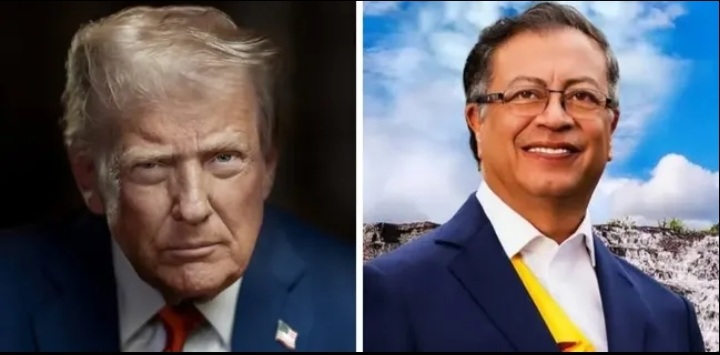CELEBRITY
BREAKING: Colombian President Gustavo Petro Says He Will Not Bow To Trump’s “Mafia-Like” Threats.

BREAKING: Colombian President Gustavo Petro Says He Will Not Bow To Trump’s “Mafia-Like” Threats.
The diplomatic standoff between Colombia and the United States has entered a new, volatile chapter. At the heart of the crisis is Colombian President Gustavo Petro, who has publicly declared that his country will not bow to what he describes as “mafia-like” threats from U.S. President Donald Trump. On the U.S. side, Trump has accused Petro of failing to stop drug-trafficking in Colombia and has threatened severe measures including sanctions and tariffs. The confrontation is highlighting issues of sovereignty, drug-policy divergence, and changing alignments in Latin American
The Trigger: Accusations and Retaliation
The conflict erupted when Trump, via social-media and public remarks, denounced President Petro as a “drug leader” and warned that the U.S. would take “very serious action” if Colombia did not get control of its cocaine production.
In response, the U.S. Treasury Department imposed sanctions on Petro, his family and certain senior Colombian officials, citing alleged failure to rein in cartels and allowing cocaine production to explode under his watch.
Petro strongly rejected the accusations, saying they stem from ignorance and a “mafia” within both Colombia and the U.S. that seeks to undermine his government. He declared: “We do not kneel. We will not take one step back.”
Petro’s Key Messages
Sovereignty and dignity: Petro emphasises that Colombia will not accept a posture of subservience. He has said that the problem is with Trump, not with the American people or the United States per se.
Rejection of the “mafia” label: He asserted that the U.S. is siding with the “Colombian mafia” and far-right interests to impose sanctions against him. “Your ally is a former president … raised within the circles of the Ochoa cartel and Pablo Escobar,” he said.
Legal defence: Petro announced that he will defend himself in U.S. courts against what he calls slanderous accusations, signalling a readiness to engage legally rather than diplomatically.
Economic retort: He warned of reciprocal economic measures if Colombia’s exports are targeted, noting that “I am informed that you impose a 50 % tariff on our human-labour product to enter the U.S., and I will do the same.”
Drug-policy and security implications: Colombia is a longstanding partner of the U.S. in the war on drugs. A breakdown in the relationship could weaken anti-narcotics cooperation, complicate military/tactical coordination, and embolden criminal groups.
Trade and economic consequences: Threats of tariffs and sanctions raise risks for Colombian exports (flowers, coffee, fruit) and foreign investment. On the U.S. side, any disruption in Colombia could have ripple effects in regional trade.
Diplomatic realignments: Petro’s stance signals a broader shift in Latin‐American governments’ willingness to challenge U.S. dominance or set independent agendas, especially in trade, sovereignty and foreign-policy matters.
Domestic politics in Colombia: By framing the dispute as one of national dignity, Petro strengthens his populist credentials. But domestic opposition may question the cost of this confrontation, especially if economic fallout occurs.
Criticisms and Risks
Domestic critics and U.S. lawmakers regard Petro’s rhetoric as dangerously provocative. For example, Latino GOP members condemned his comments suggesting Trump could be “removed” from office—interpreted as interference in U.S. internal affairs.
From Washington’s vantage, Petro’s refusal or inability to show progress on drug production and cartels gives credence to the U.S. accusations. Whether politically motivated or not, these allegations carry weight and financial consequences for Colombia.
The escalation could lead to a full breakdown in trust, making cooperation on issues like migration, security, and trade harder to manage
For U.S.–Latin America relations: This episode exemplifies how U.S. administrations can resort to economic coercion (tariffs, sanctions) to enforce policy compliance from allies. In turn, Latin American leaders may push back and seek alternate alliances (e.g., China, regional blocs).
For global shift in power dynamics: As Petro frames the issue in terms of anti-imperialism and independence, we may see more Latin American nations adopt less deferential postures toward Washington.
For the narrative around drug crime and state responsibility: Petro’s refusal to accept the premise of U.S. accusations invites a re-examination of how drug policy is framed—whether as a bilateral cooperation issue or a theatre of great-power pressure.
The confrontation between President Gustavo Petro and President Donald Trump has evolved into a symbolic battle over sovereignty, dignity, and power. Petro’s declaration — that he will not bow to “mafia-like” threats — is both a personal stance and a message to Colombia’s elite and its American interlocutors: the days of unquestioned U.S. dominance in Latin America may be ending. Whether this rhetorical stand translates into tangible change — in trade, diplomacy or security cooperation — remains to be seen. What is clear, however, is that the old rules of the game are being challenged.











